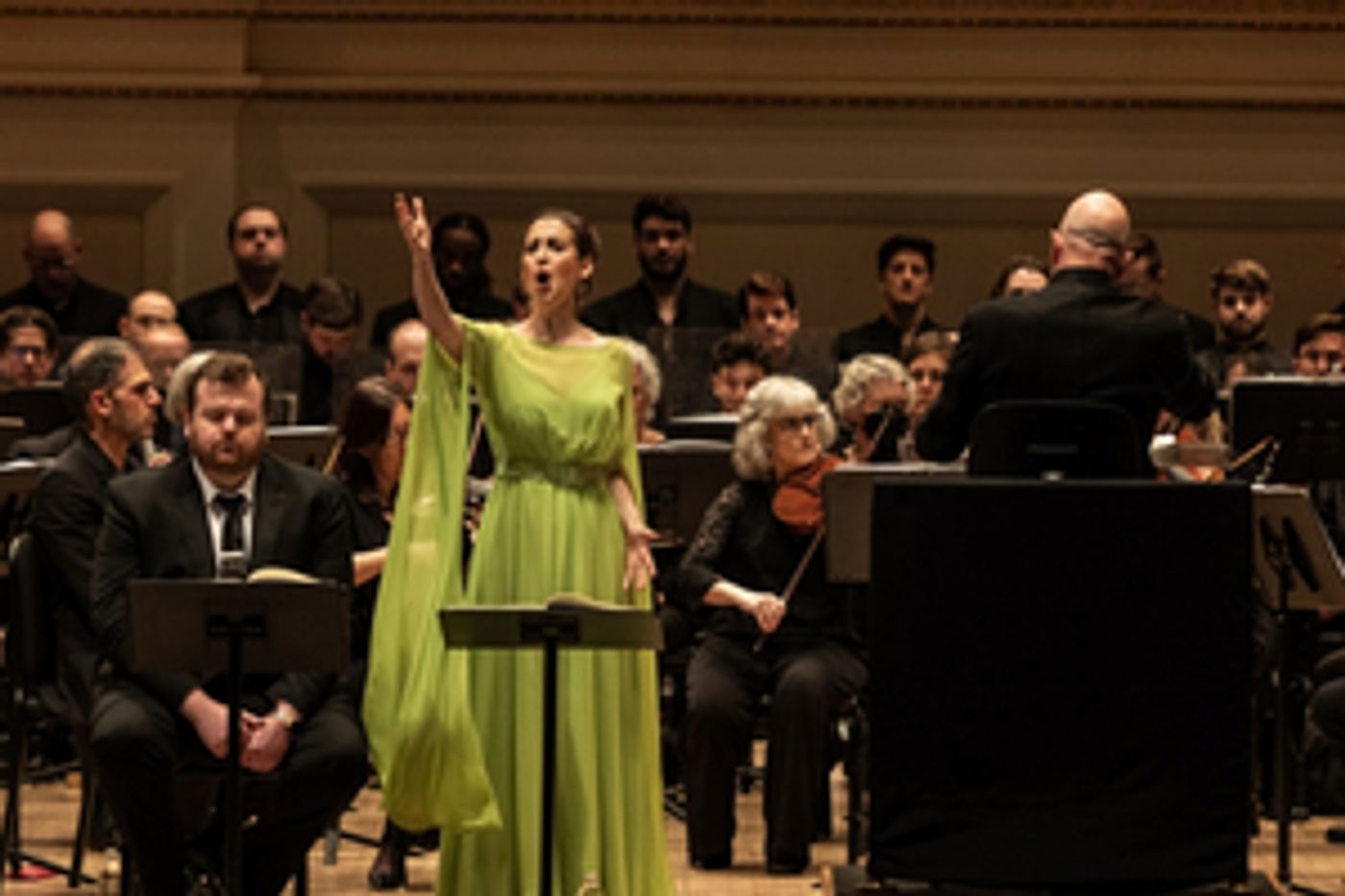Review: Botstein and ASO Bring Strauss's Seldom-Heard DAPHNE to Carnegie Hall
Despite Problematic Libretto, Fine Cast, Chorus and Orchestra under Music Director Leon Botstein, Show Opera Is Better than Its Reputation

(seated), Leon Botstein (conducting).
It's hard to compete with yourself -- especially the 'you' that was at the height of your powers.
I think that's part of the problem with the place that Richard Strauss's DAPHNE holds in the composer's canon.
Often referred to as a second- (or even third-) tier work, it has much to offer and enjoy, as the performance by the American Symphony Orchestra under Leon Botstein at Carnegie Hall the other night proved quite well.
Part of the problem, I think, is that this "Bucolic Tragedy in One Act" -- as it is subtitled, running about 100 minutes -- has a minor-league plot (libretto by Joseph Gregor) based on Greek myth, with a fine score that should keep any Strauss-lover riveted in the hands of the right singers.
The title role was sung attractively by soprano Jana McIntyre, who drew much attention last summer as Aminta in another late Strauss opera, DIE SCHWEIGSAME FRAU at Bard's summer festival, also under Botstein's baton. She did well with the difficult title role here, even if not as prettily as one might have wished for.
Still, in this Strauss-in-Wagner-mode, she brought all the rich sound that was demanded of her, along with the skills to deliver the devilish fioratura, which was no small achievement. She was in particular fine form when she mourned the loss of the love she had taken for granted, as well as when, in finishing the opera, she becomes a tree in this nature-driven piece.
The killer role here, however, is the heldentenor-ish role of Apollo, the god who is one of Daphne's would-be suitors. When Renee Fleming recorded the opera, her Apollo was the late Johann Botha, who was known for the size and power of his voice.
Tenor Kyle van Schoonhoven may have paced himself a bit early on in the exhausting role, but when the most difficult music came later in the piece, he was ready for it; he impressed with his high notes. When he reached his long aria in praise of Daphne, "Do my eyes behold heavenly beauty?" ("Was erblicke inch? Himmlische Schohnheit!"), he was in his element.
The opera has a second major role for a tenor, the heroine's other suitor, Leukippos, a shepherd who was her childhood playmate and had a tough time being taken seriously by her. It was sung appealingly by Aaron Blake, with a light approach but nevertheless with more heft to his voice than I've previously heard from him.
In the smaller but hardly unimportant roles of Daphne's father and mother, Peneios and Gaea, respectively, bass Stefan Egerstrom and mezzo Ronnita Miller did outstanding, finely drawn work.
Mezzo Marlen Nahhas and soprano Ashley Dixon easily handled the Wagner-esque music of the two maids, while baritone Kenneth Overton stood out in the musically rich role as the first of the shepherds; Jack Cotterell, Paul Holmes and Blake Austin Brooks did exemplary work as the other three shepards.
The Bard Festival Chorale, under James Bagwell, added greatly to the overall effectiveness of the evening.
The composer wrote DAPHNE near the end of his career, in the late '30s, much after his greatest works had been created. SALOME and ELEKTRA, for example go back to the first decade of the 20th century, followed closely by ROSENKAVALIER; while not as popular but still considered masterworks, ARIADNE and FRAU OHNE SCHATTEN came shortly thereafter.
DAPHNE (and another late Strauss I've liked, DIE LIEBE DER DANAE) is considered by many an afterthought of a great man. Botstein and his orchestra treated the work with respect, seeming determined to give it a chance to fly. If it didn't soar with the eagles, it certainly made a good case for itself (though perhaps not for pairing it with "An den Baum Daphne," the epilogue which began the evening and showed off the skills of the chorus).
Photo: Jana McIntyre, Kyle van Schoonhoven (seated), Leon Botstein (conducting).
Reader Reviews
Videos

